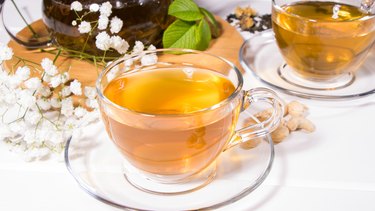
Ahh. A cup of green tea. It's soothing. You've heard it has medicinal value. It's been consumed for centuries. It's natural — made from plants no less. Sounds great so far. However, it also has caffeine — so what are the effects of green tea on blood pressure? Here's the scoop on green tea and BP.
First off, green tea is from the Camellia sinensis plant. It's the same plant that black, white and oolong teas come from, so they're all kin. The difference in each type of tea is related to how the leaves are prepared, notes the National Center for Complementary and Integrative Health (NCCIH).
Video of the Day
Video of the Day
Green tea is the least processed of those types of teas and has the most antioxidants, says registered dietitian Sonya Angelone, RDN, CLT, a San Francisco area-based spokesperson for the Academy of Nutrition and Dietetics, and its antioxidants help to stop or delay cell damage in the body.
How Green Tea Affects Blood Pressure
Green tea contains caffeine — about 35 milligrams per eight ounces of brewed green tea, according to the Center for Science in the Public Interest (CSPI), so you might be wondering if green tea raises blood pressure. (For comparison, most home-brewed coffee has about 80 milligrams per serving, CSPI reports.)
Caffeine can raise your blood pressure temporarily. The small amount of caffeine in green tea may slightly raise blood pressure in those who already have high blood pressure and who are sensitive to caffeine, Angelone says. Caution may be warranted in these cases.
But otherwise healthy people may be in the clear. A February 2020 review of 24 trials (1,697 subjects) in Medicine found that green tea or green tea extract significantly lowered systolic and diastolic blood pressure. The positive effects may be due to the catechins, or antioxidants, in green tea. However, researchers couldn't pinpoint an optimal green tea dosage, and larger, longer-term trials are needed, the authors concluded.
And in an October 2014 meta-analysis of 25 randomized trials in the British Journal of Nutrition, short-term consumption of black or green tea didn't appear to affect blood pressure. However, the researchers found that green tea consumption for at least three months helped lower both systolic and diastolic blood pressure, and even more so than black tea.
Additionally, green tea has a chemical called L-theanine that is known to help promote relaxation, Angelone says. That can help lower your blood pressure as opposed to stressful events, which can raise your blood pressure.
Safely Drinking Green Tea
If you enjoy drinking green tea, then you can likely drink up to 3 to 4 cups a day safely, Angelone says. If you have high blood pressure, you should check your blood pressure regularly when first getting in the habit of drinking green tea. Choosing decaf green tea can help avoid any possible effects from caffeine, she adds. NCCIH also notes that green tea manufacturers only have to report the added caffeine on green tea product labels, not what is naturally occurring.
You might also wonder if green tea could interact with blood pressure medication. If you use a type of blood pressure medication with the generic name nadolol, green tea could block the drug's effectiveness, NCCIH notes. "It's best to consult your physician to see if your particular medication is affected by green tea and choose decaf when possible," Angelone advises.
BP Explained
Blood pressure is the force of blood that pushes against your blood vessel walls as your heart pumps blood around the body. A normal blood pressure, says the Centers for Disease Control and Prevention, is 120/80 millimeters of mercury or lower. The top number is your systolic blood pressure, and the bottom number is your diastolic blood pressure. High blood pressure is also called hypertension.
You may have high blood pressure and not even know it. There are often no symptoms. However, having high blood pressure can put you at higher risk for serious health problems, such as strokes, heart attacks and kidney disease. Good news: You can reduce high blood pressure through medications, diet and lifestyle choices, such as more exercise, and maybe even some green tea.
Read more: 6 Teas to Stock Up On and Their Health Benefits
- Sonya Angelone, MS, RDN, CLT, dietitian, consultant, spokesperson, Academy of Nutrition and Dietetics, San Francisco
- National Center for Complementary and Integrative Health: “Green Tea”
- British Journal of Nutrition: “Effects of Tea Intake on Blood Pressure: A Meta-Analysis of Randomised Controlled Trials”
- Centers for Disease Control and Prevention: “High Blood Pressure Symptoms and Causes”
- Center for Science in the Public Interest: “Want to Know How Much Caffeine Is in Tea?”
- Center for Science in the Public Interest: “Caffeine Chart”
- Medicine: “Effect of Green Tea Supplementation on Blood Pressure”
Is this an emergency? If you are experiencing serious medical symptoms, please see the National Library of Medicine’s list of signs you need emergency medical attention or call 911.